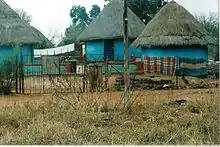Venda
Venda (/ˈvɛndə/) was a Bantustan in northern South Africa, which is fairly close to the South African border with Zimbabwe to the north, while to the south and east, it shared a long border with another black homeland, Gazankulu. It is now part of the Limpopo province. Venda was founded as a homeland by the South African government for the Venda people, speakers of the Venda language.[4] The United Nations and international community refused to recognise Venda (or any other Bantustan) as an independent state.
Republic of Venda | |||||||||
|---|---|---|---|---|---|---|---|---|---|
| 1979–1994 | |||||||||
.svg.png.webp) Flag
 Coat of arms
| |||||||||
Anthem: Pfano na vhuthihi (Venda)a Peace and Togetherness | |||||||||
 Location of Venda (red) within South Africa (yellow). | |||||||||
| Status | Bantustan (nominal parliamentary democracy) | ||||||||
| Capital | Thohoyandou | ||||||||
| Official languages | Venda[1] English[1] Afrikaans[1] | ||||||||
| President | |||||||||
• 1979–1988 | Patrick Mphephu | ||||||||
• 1988–1990 | Frank Ravele | ||||||||
| Head of State | |||||||||
• 1990–1994 | Gabriel Ramushwana | ||||||||
• Jan–Apr 1994 | Tshamano G. Ramabulana | ||||||||
| History | |||||||||
• Self-government | 1 February 1973 | ||||||||
• Nominal independence | 13 September 1979 | ||||||||
• Dissolution | 28 April 1994 | ||||||||
| Area | |||||||||
| 1980[2] | 7,410 km2 (2,860 sq mi) | ||||||||
| Population | |||||||||
• 1980[2] | 315,545 | ||||||||
• 1991[3] | 558,797 | ||||||||
| Currency | South African rand | ||||||||
| |||||||||
| |||||||||
History

| Historical states in present-day South Africa |
|---|
 |
|
|
Venda was declared self-governing on 1 February 1973,[5] with elections held later in the year.[6] Further elections were held in July 1978.[6] The territory was declared independent by the South African government on 13 September 1979 and its residents lost their South African citizenship.[7][8] In common with the other Bantustans, its independence was not recognised by the international community.
Venda was initially a series of non-contiguous territories in the Transvaal, with one main part and one main exclave. Its capital, formerly at Sibasa, was moved to Thohoyandou (which included the old Sibasa administrative district) when Venda was declared independent in 1979. Prior to independence it was expanded to form one contiguous territory, with a total land area of 6,807 km².[4] In the 1984 elections the ruling Venda National Party retained its position as ruling party, beating the perpetual opposition Venda Independent People's Party (VIPP).[6]
At independence in 1979, the population of Vhavenda stood at about 200,000 people. The state was cut off from neighbouring Zimbabwe by the Madimbo corridor, patrolled by South African troops, to the North, and from nearby Mozambique by the Kruger National Park.[4]
The first President of Venda, Patrick Mphephu, was also a Paramount Chief of the Vhavenda people; he was born and lived in Dzanani in Limpopo. His successor, Frank Ravele, was overthrown in a military coup by the Venda Defence Force in 1990, after which the territory was ruled by the Council of National Unity. Venda was re-incorporated into South Africa on 27 April 1994.[5]
Institutions of education
In 1982, the University of Venda known as Univen was established as an institution of higher learning for the Vhavenda people.[9]
Being nominally independent, Venda was able to set up a casino in the early 1980s, staffed mainly by British workers. This would not have been legally possible in South Africa proper.
Districts in 1991
Districts of the province and population at the 1991 census.[3]
- Dzanani: 123,035
- Mutale: 244,532
- Thohoyandou: 136,089
- Vuwani: 55,141
See also
- Heads of State of Venda
- Venda people (Vhavenda), the ethnic group who live mostly in the Limpopo province in South Africa.
- Venda Defence Force
References
- Chapter 2, Section 6, Republic of Venda Constitutuion Act 1979 "Luvenda, English and Afrikaans shall be the official languages of the Republic of Venda"
- Sally Frankental; Owen Sichone (1 January 2005). South Africa's Diverse Peoples: A Reference Sourcebook. ABC-CLIO. p. 187. ISBN 978-1-57607-674-3. Retrieved 18 September 2013.
- "Census > 1991 > Venda > Variable Description > ... > District code". Statistics South Africa – Nesstar WebView. Archived from the original on 19 June 2016. Retrieved 18 August 2013.
- Lahiff, p. 55.
- Worldstatesman.com has a chronology of Venda's transition to nominal independence and reintegration into South Africa.
- Elections in South Africa's Apartheid-Era Homelands "Bantustans" African Elections Database
- The Birth of a New Non-State (subscription required), in Time Magazine, 24 September 1979
- "S. Africa Launches 'Independent Black State' of Venda," in The Washington Post, 13 September 1979.
- University of Venda website Archived 4 July 2007 at the Wayback Machine. Retrieved 28 June 2007.
Sources
- Lahiff, E. (2000) An Apartheid Oasis?: Agriculture and Rural Livelihoods in Venda, Routledge. ISBN 0-7146-5137-0.